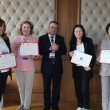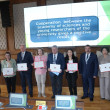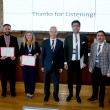TÜBA&AASSA, the Role of Science Academies in the Future of Basic Sciences
TÜBA, in collaboration with the Asian Association of Academies of Sciences (AASSA) and with support from the InterAcademy Partnership (IAP), organized the international symposium and AASSA General Assembly Meeting on the topic of "The Role of Science Academies in the Future of Basic Sciences" in Istanbul.
The symposium aimed to contribute to the recognition of basic sciences, foster discussions on related disciplines, and create awareness about the role of science academies in shaping the future of basic sciences. The participants presented papers with multidisciplinary approaches, covering topics ranging from geothermal energy to climate change, sustainable development, and inclusive and equitable education, to highlight the significance and future of basic sciences in their respective countries and within the context of science academies. The symposium consisted of four sessions and was attended by numerous scientists from science academies, science foundations, and universities from Russia, Romania, Montenegro, Belarus, Azerbaijan, Pakistan, Thailand, Morocco, and Turkey, as well as TÜBİTAK President Prof. Dr. Hasan Mandal, Prof. Dr. Nihat Berker, Prof. Dr. Bilge Demirköz, and Prof. Dr. Sezgin Bakırdere.
In his opening speech, TÜBA President Prof. Dr. Muzaffer Şeker highlighted that the United Nations General Assembly designated the year 2023 as the International Year of Basic Sciences for Sustainable Development. He emphasized that universities, research centers, and science academies from around the world are organizing a range of activities at both national and international levels in line with this designation.
In the field of basic sciences, we are facing global difficulties.
Şeker stated that TÜBA organizes various events in the field of basic sciences, and within this framework, they aim to highlight the importance of basic sciences for sustainable development and create awareness through thematic courses, such as an international summer school with the participation of 30 graduate students from different countries.
President Şeker continued as follows: "We planned this symposium as a scientific meeting focused on the main themes of the International Year of Basic Sciences for Sustainable Development in 2023. There are exciting possibilities in the field of basic sciences, and I believe this symposium is functional in discussing them. Among these possibilities, the important role that science academies, higher education institutions, academics, and scientists will play in shaping the environment of sustainability, in addition to scientific discoveries, is also included. Basic sciences form the foundation for innovation and progress in many fields, including technology, medicine, and engineering. Today, we have come together to discuss one of the most critical issues in science education, the future of basic sciences. While basic sciences have always formed the basis of scientific progress, we are faced with some significant global challenges that require urgent attention in this field. Firstly, rapidly advancing technology increases the cost of updating basic sciences themselves, the education curriculum, and scientific research outputs. As a result, research in basic sciences tends to produce ineffective research outcomes. It is crucial to invest in education and training to ensure that scientists have the necessary knowledge and skills to stay informed about the latest developments in their fields. Otherwise, the current situation can lead to undesirable consequences over time, including loss of workforce, wasted time, and human capital flight. Additionally, there is an ongoing employment problem for graduates of basic sciences departments. This issue is a growing concern in many countries worldwide."
Basic sciences have made a significant breakthrough in the modern era and have influenced every aspect of human life.
TÜBA Principal Member and AASSA President Prof. Dr. Ahmet Nuri Yurdusev stated that basic sciences have undergone a major advancement since the 17th century in the modern era and have impacted every area of human life. He said, "Science academies emerged and developed from the 17th century onwards. This is not a coincidence; it is an indication that science and science academies have contributed to each other's development. Science academies contribute to the effective implementation and institutionalization of science. Basic sciences constitute the backbone of AASSA and its members, who always prioritize sustainability and sustainable development goals. I am confident that this symposium will make a significant contribution in this regard. I would like to express my gratitude to all participants for their valuable contributions. I also extend my thanks to TÜBA President Prof. Muzaffer Şeker for organizing and hosting such a comprehensive symposium. I want to say that AASSA is always pleased to be in collaboration."
In his video message for the symposium, President Prof. Dr. Antonio Loprieno of ALLEA emphasized that the topic of the symposium reflects a paradigm shift that affects everyone globally, regardless of the continent it is held on or the potential differences in reading the world and its problems.
Our ultimate goal is to eventually make our World a better place.
Prof. Dr. Antonio Loprieno stated the following: "As scientists, we are aware of the importance of research being reliable and serving as a foundation for social and political decisions. As international scientists, we seek solutions through our fundamental research to improve our quality of life both materially and ethically. In this regard, academies bear great responsibility, and I applaud the decision of our Turkish colleagues to organize a symposium on the role of academies in better understanding the fundamental sciences. I cannot speak for the situation in Asia, but speaking for my own continent, I believe that the role our academies used to play as the "producers of scientific outcomes" was a typical characteristic, but it has now changed. This producer role is now more often performed at the university level, with a greater focus on science communication at the societal level and, at the same time, on science advice at the national level and to a lesser extent at the international level. In my personal opinion, this shift in focus from science production to the representation of fundamental science makes our responsibilities as Science Academies even more significant in our civil societies. Our ultimate goal is to make our world a better place, and I am very happy about that. I apologize for not being personally informed about your views. On behalf of all your European colleagues, I extend my best wishes to all of you. I wish you an inspiring two days."







































































